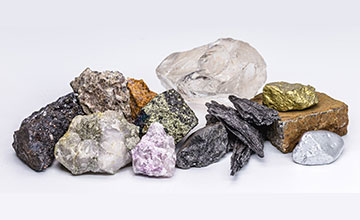Mineral Based Industries
Mineral-based industries play an essential role in shaping economies, providing the raw materials for countless products and infrastructure developments. These industries are pivotal for advancements in technology, construction, and manufacturing.
What Are Mineral-Based Industries?
Mineral-based industries are those that use mineral ores as the primary raw materials for producing goods. These industries process minerals to produce products that serve various purposes, such as construction materials, machinery, electronics, and even consumer goods. For instance, the iron and steel industry are one of the largest mineral-based industries, converting iron ore into steel used in construction and manufacturing.
Industries like cement, iron, and aluminium production fall under this category, and they play a crucial role in supporting infrastructure development across the world. These industries depend heavily on the availability of minerals, their efficient extraction, and the technologies involved in refining and processing them into usable forms.

What Are Minerals and Ores?
Minerals are naturally occurring inorganic substances with a defined chemical composition and crystalline structure. They form the foundation of Earth's crust and are critical to a variety of industrial and manufacturing processes. Some common minerals include quartz, soda feldspar, and mica. Minerals are typically mined from the Earth through various techniques, depending on their nature and location.
Ores, on the other hand, are types of rocks that contain a significant concentration of a particular mineral or metal. These are valuable for extraction purposes. For instance, iron ore is mined to extract iron, which is used to manufacture steel. The process of separating valuable minerals from ores is an essential component of the mineral-based industry.
Minerals and Mining
Mining refers to the extraction of valuable minerals or other geological materials from the Earth. It can occur on the surface (open-pit mining) or underground, depending on the location and depth of the resources. Mining is a critical industry that fuels other sectors like manufacturing, energy, and construction. Quartz mining, for example, is a common activity, as quartz is an important industrial mineral used in electronics, glassmaking, and ceramics.
Minerals are mined through different techniques, including open-pit mining, underground mining, and placer mining. Mining minerals such as gold, copper, iron, and coal are integral to modern civilization and have supported infrastructure development for centuries. However, with increased mining activities, environmental and sustainability concerns have emerged, leading to innovations like smart mining.
Distinguishing Between Agro-Based and Mineral-Based Industries
Industries can be broadly classified into agro-based and mineral-based industries, each relying on distinct types of raw materials and serving different economic sectors.
- Agro-Based Industries: These industries are dependent on agricultural raw materials such as cotton, sugarcane, jute, and food grains. They include textile industries, food processing, and sugar industries. For instance, a textile factory that processes cotton into fabric is part of the agro-based sector. These industries are typically located near agricultural regions and are highly influenced by the agricultural output of a given area.
- Mineral-Based Industries: In contrast, mineral-based industries rely on minerals and ores as raw materials. These industries include sectors like steel manufacturing, cement production, and the chemical industry. For example, a cement factory uses limestone, a mineral, as a key ingredient. Mineral-based industries are often located near mining sites to reduce the transportation costs of raw materials.
The key difference between agro-based and mineral-based industries lies in their raw material sources. While agro-based industries depend on organic, renewable agricultural resources, mineral-based industries use non-renewable, inorganic natural resources that must be extracted from the Earth.
Industrial Minerals and Their Importance
Industrial minerals are non-metallic minerals used in a wide range of industrial applications. These include materials like limestone, silica, talc, clay, and mica. Unlike metallic minerals (such as iron or copper), industrial minerals are not mined for their metal content but for their physical and chemical properties, which make them essential for various industries.
For instance, quartz mining is significant in industrial minerals, as quartz is used in producing glass, ceramics, and electronics. Another example is specialty minerals like barite, used in drilling fluids for oil and gas exploration, and fluorite, used in the manufacture of hydrofluoric acid and other chemicals.
The Rise of Smart Mining
Mining has traditionally been a labour-intensive industry with environmental challenges. However, the emergence of smart mining is transforming the landscape. Smart mining refers to the use of advanced technologies, such as automation, robotics, data analytics, and IoT (Internet of Things), to improve mining operations. These technologies help increase efficiency, reduce costs, and minimize the environmental impact of mining.
For instance, automated trucks and drilling systems are increasingly being used in mining operations to perform tasks with greater precision and safety. Real-time data analytics enable mining companies to monitor operations, predict maintenance needs, and optimize resource management. By reducing human involvement in dangerous tasks, smart mining also enhances safety measures.
The Future of Mineral-Based Industries
As industries continue to grow and adapt, the importance of minerals and ores remains a constant. While traditional mining practices have served the world for centuries, the future of mineral-based industries lies in innovations like smart mining and more sustainable practices. The integration of advanced technology into mining operations not only increases efficiency but also ensures that mineral extraction becomes more environmentally friendly.
With the growing demand for minerals in various sectors, including renewable energy, electronics, and infrastructure, mineral-based industries will continue to be a driving force in global economic growth. Whether it's through quartz mining for the electronics industry or the development of new specialty minerals for industrial applications, these industries are integral to progress and innovation.
Mineral-based industries are fundamental to modern economies, providing the raw materials necessary for industrial processes, infrastructure, and technological advancements. As innovations like smart mining continue to reshape the landscape, the future of mineral-based industries is poised for more efficient, sustainable, and responsible growth.

